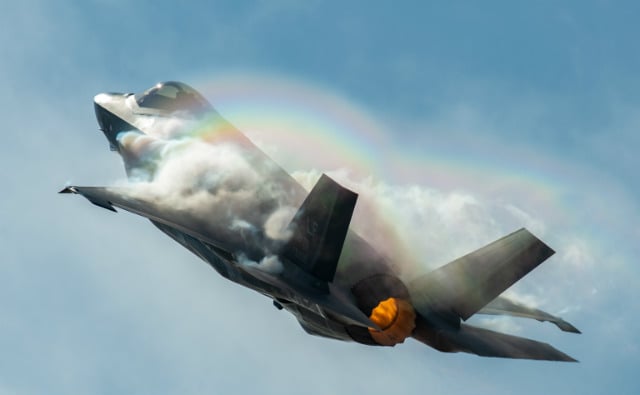
US Air Force F-35A
Back in the day, I spent a year covering the raging battle between the Senate and House Armed Services Committees over Buy America legislation the House tried really hard to push into the National Defense Authorization Act. HASC Chair Duncan Hunter raged and fretted and pushed and pushed and was met at every turn by Sens. John Warner and John McCain, aided by the Aerospace Industries Association and a range of senior officials at defense primes. Hunter finally was quashed, soundly and permanently. We never saw him try again. Now Bill Greenwalt, who worked for Warner and McCain on the SASC, raises the alarm again. What’s at stake? Read on! The Editor.
House and Senate conferees hammering out the National Defense Authorization Act must consider whether the United States will further alienate our closest allies, undermine our national security, and destroy thousands of U.S. jobs in the process or drop House language that would have those effects.
Protectionist spirits have been released on many fronts in the last few years. Now the House of Representatives in “Back to the Future” campaign mode wants to pass the Buy American Act of 1933 all over again. This return to an America First Committee-type autarky and isolationism is contained in a provision sponsored by Rep. Donald Norcross. It would require that 75% of the Pentagon’s major defense acquisition programs be manufactured and sourced within the United States by October 2021 and 100% by 2026.
This would be a declaration of a defense trade war by Congress.

F-35 Wing Assembly in Cameri, Italy
“Buy America” may sometimes be good domestic politics but really dumb economics and national security policy, particularly if you need allies. It should come as no surprise that our closest allies are deeply concerned about the House language. They correctly understand that the provision is designed to ensure there will never again be another successful multinational defense cooperative partnership like the F-35, the most successful international weapons program in history.
Last month, a grouping of our 25 closest allied partners sent a very cautious and correct diplomatic response to the House and Senate urging them, in essence, not to declare a defense trade war on them. This letter is being followed up by individual outreach by respective embassies here in Washington. These polite tugs will likely not be enough to sway the protectionists in Congress where isolationism, fear and folly have seemingly overtaken both parties.
Since our allied nations still believe in the niceties of proper diplomacy, I will translate what they are saying.
First, the House Buy American provisions will destroy U.S. jobs when these countries look for other alternatives than buying from the U.S. Secondly, Congress would be ripping up and overriding signed agreements with our closest allies that have served as the foundations of reciprocity in defense trade and cooperation within NATO and with other partners such as Australia and Israel for over 40 years. This will undermine NATO and our commitment to our global alliances. Combined with the Trump Administration’s unbalanced “America First” policies, our days of being a trusted partner would be numbered. Congress must not lose its senses too.

Rep. Donald Norcross
Our allies clearly understand that if this pending legislation passes the likelihood of the U.S. buying anything from foreign suppliers in the future will be close to zero. Given this, why would the governments of Canada, Finland, or Singapore — all now considering purchasing the F-35— make a decision to buy American at this time? It has been recently reported that the UK, perhaps already seeing the writing on the wall, is considering halving its F-35 buy and building its own fighters with other nations. Our other F-35 partner nations could be expected to do the same. Lest we think this is only a Lockheed Martin problem, let’s be clear that every U.S. defense company’s current and future export sales are now in jeopardy to those 25 nations with a reciprocal defense trade agreement. If the House language were to become law, our allies will most assuredly buy European, Asian and Australian sending untold billions of dollars and thousands upon thousands of jobs to those countries.
The U.S. would not gain anything from this new Buy American Act. The U.S. currently has a yearly $90 billion surplus (i.e. we sell more than we buy) in defense and aerospace trade that will evaporate if the House language becomes law. The imbalance is so great that according to the most recent data from GAO, the entire U.S. government (including DOD) buys less than $8 billion directly in goods and services from foreign sources each year. For many reasons, including barriers to trade mostly related to security, the deck is already stacked against our allies selling into the U.S. defense market. Why the House would want to remind nations at this time about the current one-sidedness in defense trade that favors the U.S. is unfathomable.
It is doubtful that the House is prepared to increase the defense budget by the necessary amount to offset the damage it would inflict on the U.S. defense industrial base and on U.S. jobs when export sales are eliminated. But what may even be more important to our national security is the U.S. warfighter’s loss of access to the greater innovations that now reside within the industrial bases of our allies. For example, Lockheed Martin has learned some advanced manufacturing techniques from their Italian partners in the F-35 program. These countries have begun to have comparable and, in many cases, superior technology than what is produced in the U.S. Our enemies, unfortunately, are racing even further ahead.
A declining U.S. technological advantage should be a wakeup call for every member of Congress and every American. The bottom line for America is simple: the U.S. can no longer afford to go it alone as it begins to fall behind technologically and militarily. If we raise protectionist legislative barriers to our allies’ participation, we will not be able to access their technology. Our current position is not going to get any better if we force ourselves to buy decades-old outdated equipment from U.S. sources when superior solutions are available, — not from China — but from our friends.
The sponsors of this legislation may try to assure our allies that waivers for their participation will be available and that the real focus is on China. If you buy that argument, I have a bridge to sell you. The sponsors know full well that DOD lawyers and contracting officers will look at the wording and intent of this legislation and make it even more difficult than it already is for allies to participate in U.S. defense programs. Contract solicitations will include U.S. only requirements and there will be little or no time for allies to react to these proposals and have any chance of obtaining a possible limited waiver.
If the real issue is China then Congress should be laser focused on China’s already advanced infiltration of our defense supply chain and not punish what few allies we still have left for trying to sell us better systems that our forces desperately need. There already is a specific prohibition in law directed at Chinese suppliers that could be codified and strengthened. That approach would address the specific Chinese supply chain problem in a more appropriate section of law without the collateral damage done by treating our allies like our adversaries.
Over the decades, the House has proposed a number of imprudent “Buy America” provisions knowing full well they would likely never make it into law. The most sustained was by the House Armed Services Committee under Chairman Duncan Hunter (the older one), who worked hard to send a risk-free political messaging strategy. He sent the message and was rebuffed soundly and repeatedly by Sen. John Warner and the late Senator John McCain. These great Senate internationalists worked with both Democratic and Republican Administrations to ensure that a strong veto threat was in place for any domestic source restriction similar to the Norcross provision because it is simply not in our national interest.
Those days are long gone and it is questionable whether anyone in Congress is now able to stand up to the protectionists and isolationists. What is even worse that is there is now no backstop to congressional recklessness because, for the first time in our recent history, we have a blatantly protectionist administration that could no longer be seen to legitimately threaten to veto such language. When the conferees and the U.S. defense industry (that has been notoriously and surprisingly silent on this issue) think about this provision and the differences in our current international and domestic situation, they must realize that if this provision passes it is “game over” for defense cooperation with our allies. The losses in arms sales and innovation will be enormous. Hopefully, someone in the room who still cares about working with our allies will argue for the right answer when the NDAA conferees consider this language. America’s national security depends upon it.
Bill Greenwalt, long the top Republican acquisition policy expert on the SASC, rose to become deputy Defense undersecretary for industrial policy. A member of the Breaking Defense Board of Contributors, he’s now a fellow at the American Enterprise Institute.






















